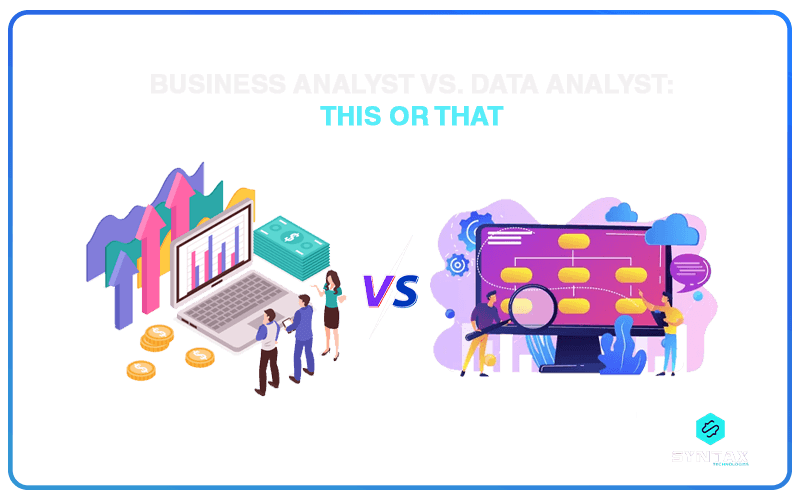Where there is a Data Smoke; there is a Business Fire. – Thomas Redman
Gone are the days when business leaders exceedingly relied upon their gut instincts and past experiences in taking business decisions. Decisions are increasingly being taken on the basis of hard core facts and data.
Big Data is largely being seen as the trump card which if efficiently utilized can result in unimaginable gains for business organizations. Consequently, professions associated with Data, is all set to soar to new heights in times to come.
If you too happen to be someone who is facing a professional dilemma and is not being able to choose between being a Business Analyst or a Data Analyst or a Data Scientist, this blog is for you. We do take up one of the highly debatable issues: Business Analyst vs. Data Analyst.
In this blog, we shall take up the issue of Data Analyst vs. Business Analyst. The issue will be sought to be understood through different lenses such as Business Analyst vs. Data Analyst: a Comparison of Skills, Roles and Responsibilities, Educational Background as well as Data Analyst vs. Business Analyst Salary. Consequently, we shall also try to investigate the topic of Business Analyst vs. Data Scientist.
Who are Business Analysts?
Business Analysts are professionals who are responsible for making use of data for undertaking critical business decisions. They even help in discovering innovative solutions to persistent business problems through business analytics.
They help in evaluating the efficiency of business expenses and processes, along with communicating the insights to stakeholders and other teams. They help to develop strategic business procedures and arrangements for driving business profitability.
Who are Data Analysts?
Data Analysts are qualified professionals responsible for acquiring data from different sources, cleaning and organizing it as well as conducting data analysis on it. They happen to sift through data in order to identify patterns and trends, thus converting valuable business information into actionable insights.
They make use of different Data Manipulation techniques in order to interpret complex datasets. In this capacity, they should be proficient in deriving meaning from numeric data, have a strong grip over programming languages, as well as be adept in the fundamentals of data handling. Data Analysts tend to operate on structured data for resolving quantifiable business problems.
Who are Data Scientists?
Data Scientists generally hold senior positions and are possessors of advanced degrees. They utilize more advanced data techniques and strategies like neural networks, clustering, decision trees and so on; for not only interpreting and analyzing data, but also for making predictions about the future in the form of predictive analytics.
They are highly proficient in Coding, Statistics, Mathematical Modeling as well as machine learning. Skilled with advanced programming, they are capable of creating new processes for Data Modeling within the field of Data Science.
Business Analysts vs. Data Analysts: Educational Requirement
In this section, we shall look at the difference between a Business Analyst and a Data Analyst in terms of the differing requirements of academic background.
Business Analysts generally possess an undergraduate degree in a business-focused major. This is essentially because Business Analysts are responsible for exploiting and making use of data for rendering business operations more efficient.
On the contrary, if you are seeking to pursue a career as a Data Analyst, you can well be required to possess a bachelor’s degree in a related field like Statistics, Finance, Mathematics or Computer Science.
According to a survey conducted by IBM in 2017, very few job postings for Data Analysts require them to possess a Master’s degree. Thus, Data Analysts generally come from a background of STEM majors and have more extensive knowledge of databases, programming, predictive analytics and so on; as compared to Business Analysts.
Data Analyst vs. Business Analyst: Roles and Responsibilities
In this section, we shall look at the difference between Business and Data Analysts in terms of what the two professionals are expected to do in their professional capacity.
Data Analyst
- Collecting Data from all possible Sources (Primary as well as Secondary)
- Identifying the Needs of the organization in liaison with the firm leaders
- Data Cleaning, Data Organization and Data Mining
- Writes SQL queries in order to derive Answers for Business Questions
- Work with customer-centric algorithm models
- Detect Data Quality Issues
- Conducting Data Analysis of Datasets in order to identify Trends and Patterns which could be converted into actionable Insights for making strategic Business Decisions
- Applying Retrospective Analysis, Statistical Analysis, A/B Tests
- Designing and Creating Data Reports using different Reporting Tools
- Presenting one’s Findings and Conclusions in easily comprehensible forms of Data Visualization
If you wish to read in detail on the topic of Data Visualization, do read our blog on Data Visualization Examples: Good, Bad and Misleading.
Business Analyst
- Assessing the existing functions and IT structures of the Company
- Estimating business processes for cost, efficiency and other valuable metrics
- Presenting findings and communicating insights to stakeholders and the management
- Coming up with strategic recommendations for improvement in performance, process adjustment and so on
- Working in collaboration with third parties and internal teams for escalating and resolving issues
- Business Analysts happen to be concerned with the business application of data, operating at a conceptual level, developing strategies
Data Analyst vs. Business Analyst Salary: Difference in Career Prospects
In this section, we shall investigate the issue of Business Analyst vs. Data Analyst Salary.
As per the report by Robert Half Technology (RHT)’s 2020 Salary Guide, the earning potential of a Data Analyst is generally held to be in the estimated range of $83,750 and $142,500. Additionally, they have the option of increasing their market value by acquiring further new skills.
Since Business Analysts are generally not required to have as deep a technical grounding as Data Analysts, entry level positions for Business Analysts might fetch a slightly lower salary as compared to Data Analysts.
However, the salary of Business Analysts in senior positions or high demand industries might surpass that of Data Analysts. The average base salary for a mid-level Business Analyst within the technology industry is estimated to be around $110,000.
Business Analyst vs. Data Scientist
The issue of Business Analyst vs. Data Scientist will be sought to be explained through an analogy.
A Business Analyst is akin to a Doctor. A doctor is well trained within the health industry. Even within the industry, different doctors happen to be specialized in specific matters of health. On much the same note, a Business Analyst (like a doctor) is an expert of the specific industry, within which they happen to be working.
For instance, a Business Analyst within the car industry is an expert on cars. Operating within a given industry, a Business Analyst acquires and processes information on profit, loss and growth of the industry, just like a doctor collects and processes information of different patients.
In contrast, Data Scientists are not experts within a specific field. They are more concerned with gauging the pulse of the market and finding ways and means for best analyzing data within any organization, irrespective of the industry within which they are working.
Unlike Business Analysts who are always after business summaries and overall profits; Data Scientists are more concerned with discerning specific patterns and trends in data.
Besides a Business Analyst, the professional designation of a Data Analyst too is often confused and held to be overlapping with that of a Data Scientist. Seeking to get more clarity on the topic refer to our blog on “Data Analyst vs. Data Scientist: Understanding the Two Positions“
Conclusion
The professions of a Data Analyst and a Business Analyst do come quite close to each other. This is true to the extent that many organizations end up referring to the two designations, interchangeably. However, this is not technically correct.
Even though, both a Data Analyst as well as a Business Analyst happen to deal with data; they do so in different ways. While a Business Analyst views data as a means to an end; a Data Analyst views data as an end in itself. Thus, the issue of Business Analyst vs. Data Analyst is definitely a real one.
The designations of a Business Analyst as well as a Data Analyst have emerged as hot selling career prospects within the job market. This is especially true because of the lucrative propositions which the two fields have to offer. Given so, trying to improve one’s employability in line with the demands of these fields, will only be a wise choice.
What does the future of the Data Analytics domain has in store? Check out our blog on the “Future of Data Analytics: Looking at what is to come“
We, at Syntax Technologies, provide you with the amazing opportunity for developing skills as a Data Analyst. Enroll now for our Data Analytics course.

